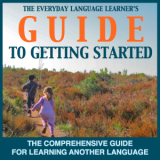Do I need to understand everything?
My method for learning Polish involved mainly reading and listening to books in Polish. There are many variations on this method that involve the use of movies, podcasts or even video games instead of books.
As long as the method focuses on understanding real language and there is some listening component - it will be very effective.
The main challenge is understanding this language when you are still learning (especially listening).
Lately, I've been receiving a lot of emails that say something like:
When we are listening to podcasts (for example), do you think it's worth it to try and understand as much as possible? Should we listen to the same recording over and over until we understand everything?
Read more for my response!
How to become a self-directed language learner
Most people associate language learning with school and a classroom and - above all - with a teacher.
When you're taking a traditional course, the teacher guides you through the language: "Today, we're going to work on the past tense. Next week, there is going to be a test. You need to work on your pronunciation of the th sound."
The student is passive and just along for the ride. This can be both good and bad.
On the positive side, everything is planned for you - you don't need to worry about finding good resources. You also have a great source of advice and feedback.
But on the negative side:
- The topics might not be connected with your personal needs and interests - it could be boring
- The course might move too quickly or too slowly
- There tends to be too much focus on what is easy to test or evaluate, i.e. grammar
And let's face it: some people just don't learn well in classrooms! A few might excel in this environment, but the rest learn better from experience and self-guided exploration.
But how do you get started as a self-directed language learner?
Today I'm going to review The Everyday Language Learner's Guide to Getting Started. It's a cheap ($8) e-book that can guide you from not knowing how to start to being a totally self-sufficient language learner.
(Full disclosure: While I did receive a free copy of the e-book to review, I don't receive any money if you decide to purchase it.)
Read more for the full review!
How to listen effectively

A couple weeks ago, I wrote an article about the importance of listening.
Thanks, everyone for the really excellent comments on that post! You helped me realize that I forgot to discuss a very critical point: how to listen effectively.
Read more for some helpful advice!
Language learning guide?

I receive a lot of emails and comments asking me for advice on language learning. I respond to all of them, so when I notice that I've answered the same question a lot, I try to write an article about it on my blog.
That way, when someone asks me that question again, I can point them to a well-polished article, instead of having to come up with a completely new explanation in the 5 minutes I have to respond to their email.
The article I wrote a couple weeks ago about the importance of listening is one example. However, I got some really great questions in the comments which helped me realize that I left out a very important piece: how to listen, when you don't yet speak the language very well.
Eventually, this will end up becoming a new article.
But wouldn't it be great if I could just have a page somewhere that includes all of my thoughts about listening? As new questions or ideas come up, I could continue to refine it.
This got me thinking that maybe I should be compiling a language learning guide, that covers my opinions about how to learn a language effectively, lots of tips, and the basics of my method.
Read more for my thoughts and let me know what you think!
8 reasons to use YouTube to learn a language

As most of you probably know, I've been using YouTube in my effort to learn Polish for over three years now.
YouTube is a massive service, with "hundreds of millions of users from around the world." According to their FAQ, "48 hours of video are uploaded every minute, resulting in nearly 8 years of content uploaded every day."
Using YouTube has led to many very positive things in my life and, in my opinion, has also significantly improved my language abilities.
I strongly encourage YOU to try using YouTube in your language learning!
Read more to find out why!
The Importance of Listening
I receive many questions from people looking for advice on how to use the method I used to learn Polish in their own language studies.
The main misconception is that reading (with your eyes) is enough. This is partly my fault, since I think of listening to a book or text to still be "reading," so I've used that word to describe both activities.
But listening is not just as important as reading - listening is even more important!
If possible (especially when beginning to learn a language) you should spend significantly more time listening than reading.
Read more to find out why!
How to learn two languages at once
Can I learn two languages at once? Or should I only learn one at a time?
I see these questions often.
Many people have successfully learned more than one language at a time. But many, many more have failed.
Personally, I have experience both succeeding and failing!
Please read more for my advice!
Translating or native dictionaries?
Which is better? A dictionary which translates into your native language or a dictionary which gives the definition in the native language itself?
This is an often discussed and frequently controversial topic. Both students and teachers have strong opinions on both sides of the issue. But I suspect it comes to more to personal preference than anything else.
In this article I'll tell you which I prefer and why, then open it up to your comments. Which do you prefer?
Read more to join the discussion!
How to practice speaking over the internet

Nothing can replace practicing your language with a native speaker. But what if no native speakers live in your city? Not everyone has the means to travel to another country.
But that doesn't mean you can't practice speaking!
I've written about language exchange in the past.
This is where you meet with someone who's native language is the language you are learning and your native language is the language they are learning. For the first half of the meeting you talk in one language and for the second half you talk in the other.
And the best part is that this is something you can do entirely over the internet, using voice chat software like Skype!
Read more to learn how!
How to learn words with multiple meanings

In all languages, there are words with several, seemingly unrelated meanings - and English is no exception.
According to the Merriam-Webster dictionary, the word "get" has over 20 different meanings! It's even hard to count them all. :-)
So, what's the best way to learn words with multiple meanings?
Read more for my advice!









